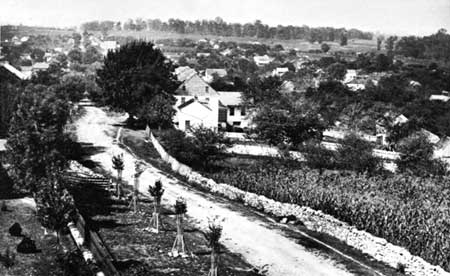|
ANTIETAM National Military Site |
 |

Sharpsburg shortly after the Battle of Antietam. Taken from crest
of Sharpsburg Ridge, looking west down Boonsboro Pike toward Potomac River.
Hagerstown Pike heads north (right) just beyond large tree in left-center.
Lee's headquarters were in Oak Grove in distance, just to right of Boonsboro
Pike.
Lee Takes a Stand on Sharpsburg Ridge
Lee's decision to make his stand on the low ridge extending north and south of Sharpsburg might well have led to disaster for the Confederate army. A large part of his force was still scattered and several miles away. Backed against the coils of the Potomac River, with only the ford near Shepherdstown offering an avenue of withdrawal, a reversal in battle could result in rout and consequent loss of thousands of men and scores of guns. Longstreet voiced disapproval of battle at Sharpsburg. Jackson, hurriedly examining the ground on his arrival from Harpers Ferry, strongly favored Lee's choice.
The village of Sharpsburg lies in a small valley at the western base of Sharpsburg Ridge. From the village, the Boonsboro Pike leads east across the ridge, then across Antietam Creek. The Hagerstown Pike extends northward on the crest of the ridge.
From the Hagerstown Pike, gently rolling farmland spreads a mile eastward to Antietam Creek and the same distance westward to the winding Potomac River. A mile north of Sharpsburg was a heavy patch of trees known as West Woods; it was about 300 yards wide at its southern limits, tapering to 200 yards or less as it stretched away northwest from the pike. Half a mile east of Hagerstown Pike was another patch of trees called East Woods; it was 200 yards wide and extended a quarter mile south across the Smoketown Road. North Woods, a triangular plot of trees, stretched east from the Hagerstown Pike over the Poffenberger farm. Half a mile to the west looms Nicodemus Hill, a prominent landmark near the Potomac. Artillery on its heights would command the open ground lying between the patches of woodland. In this open area east of the Hagerstown Pike lay a 40-acre cornfield. West of the pike were outcroppings of rock running nearly parallel to the road—ready-made fortifications. Adjacent to the Hagerstown Pike, on a slight rise near the lower end of West Woods, stood a Dunkard Church, a small white building framed by massive oaks. Southeast of Sharpsburg, rolling land broken by deep ravines extends a mile beyond to a sharp bend in Antietam Creek.
Crossings of swiftly flowing Antietam Creek were readily available. The road extending northwest from Keedysville went over the stream at the Upper Bridge, the road to Sharpsburg from Boonsboro over the Middle Bridge, and the road to Sharpsburg from Pleasant Valley over the Lower Bridge. The stream could be crossed, also, at Pry's Mill Ford, a half mile south of the Upper Bridge, at Snavely's Ford, nearly a mile south of the Lower Bridge, and at other unnamed fording places.
With its advantages of woodland and outcroppings of rock ledges, Lee believed that the ridge north of Sharpsburg offered a strong battle position. Though he had ample time to construct earthworks, the Confederate commander chose to rely wholly on natural defenses.
As Lee's men approached from Boonsboro during the morning hours of September 15, they turned left and right off the pike to form their lines on Sharpsburg Ridge. Brig. Gen. John Hood, with only two brigades, held the ground at the fringe of the West Woods—from the Dunkard Church northwest to Nicodemus Hill near the Potomac. Here, Stuart's cavalry protected the left end or flank of the line. From Hood's position southward to Sharpsburg, D. H. Hill placed his five brigades east of and paralleling the Hagerstown Pike. Brig. Gen. Nathan Evan's brigade occupied the center of the line in front of Sharpsburg; his men straddled the Boonsboro Pike. The six brigades of Maj. Gen. D. R. Jones extended the Confederate front southeast nearly a mile to the Lower Bridge over Antietam Creek. The fords over the Antietam at the extreme right of the line were guarded by Col. Thomas Munford's cavalry brigade. Artillery was placed at vantage points on the ridges.
Throughout the 15th, Lee presented a show of strength with 14 brigades of infantry and 3 of cavalry—about 18,000 men.

|

|
|
Last Modified: Mon, Mar 4 2002 10:00:00 pm PDT |


